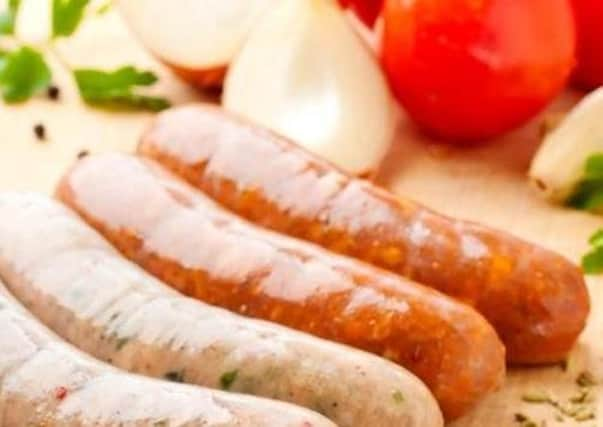Irish Sea border toughens from today as red tape hits many British meats


The ‘export health certificates’ [EHCs] to allow such products to enter Northern Ireland are only temporary, as from July 1 they will be banned altogether under strict EU laws on animal and plant health.
Sausages, mince and pate-type products made in GB are currently only allowed into Northern Ireland under the terms of a six-month grace period.
Advertisement
Hide AdAdvertisement
Hide AdThat will expire at the end of June unless the EU and UK can strike a deal on the issue in the interim.
Bans on other GB agri-food products – including seed potatoes, certain seeds, and plants potted in soil – have already been in force since the start of the year.
Under the terms of the Northern Ireland Protocol, all non-prohibited agri-food goods arriving from GB require an EHC declaring that they pose no risk.
There was no initial requirement for certifications on these restricted products when the Irish Sea border began on January 1.
Advertisement
Hide AdAdvertisement
Hide AdToday that changes, with traders now requiring Defra’s version of an EHC for sausages and mince.
Aside from those prohibited list items, EHCs are now required for non-retail agri-food products entering Northern Ireland from GB.
That has included unprocessed food stuffs – such as chicken carcasses, tankers of milk and sides of beef – being imported for processing.
Retail products have been exempted from this requirement under a grace period that will expire on April 1.
Advertisement
Hide AdAdvertisement
Hide AdFrom that date, GB-made agri-food products that are usually found on supermarket and shop shelves in Northern Ireland will need an EHC.
This includes all food of animal origin, some foods of non-animal origin (such as nuts and spices), live plants, other plant-based products and fish. Live animals and animal-based food products require a vet to sign off the EHCs.
During the three month grace period for retail produce, traders have instead been asked to complete a single operator declaration for each lorry-load of goods crossing the Irish Sea.
This is signed by a representative of the company shipping the goods, declaring that they comply with EU standards and regulations.
Advertisement
Hide AdAdvertisement
Hide AdLast week European Commission vice-president Maros Sefcovic said that simplifying EHCs and extending the grace period for traders were measures being considered to smooth the implementation of the protocol.
He said that there were many “benefits” for Northern Ireland, and added: “I believe that we found a very unique solution where Northern Ireland is part of the single market, and at the same time off course it is the part of the internal UK market.
There are hundreds of types of EHCs, with different forms for different products – and some items having multiple versions.
As sausages and other chilled meat products are not ordinarily allowed to be imported into the EU under the bloc’s tight sanitary and phytosanitary (SPS) regulations, there is not an EHC covering those goods.
Advertisement
Hide AdAdvertisement
Hide AdAs a result, Whitehall’s Department of Environment, Food and Rural Affairs (Defra) has developed its own temporary version, to satisfy EU requirements during the six month grace period when their import is still permitted.
The shipping requirements will increase dramatically from April 1 when EHCs will be required for individual agri-food product lines on a lorry.
Products going to multiple destinations will require multiple certifications. That could see a single lorry requiring hundreds of EHCs.
The grace period was intended to give traders time to adjust their shipping models to reduce the regulatory processes required. Packing containers with larger quantities of a limited number of product lines, rather than loading them with small quantities of multiple products, would potentially achieve that, as would ensuring the lorry only goes to one destination.
Advertisement
Hide AdAdvertisement
Hide AdThere was no grace period on retail agri-food goods entering the Republic from GB and there is evidence those traders have already made adaptations. Supermarket lorries arriving in NI from GB for onward transport south of the border have been registering around a dozen EHCs per load in recent weeks.
READ MORE:
Advertisement
Hide AdAdvertisement
Hide Ad——— ———
A message from the Editor:
Thank you for reading this story on our website. While I have your attention, I also have an important request to make of you.
Advertisement
Hide AdAdvertisement
Hide AdWith the coronavirus lockdown having a major impact on many of our advertisers — and consequently the revenue we receive — we are more reliant than ever on you taking out a digital subscription.
Subscribe to newsletter.co.uk and enjoy unlimited access to the best Northern Ireland and UK news and information online and on our app. With a digital subscription, you can read more than 5 articles, see fewer ads, enjoy faster load times, and get access to exclusive newsletters and content. Visit https://www.newsletter.co.uk/subscriptions now to sign up.
Our journalism costs money and we rely on advertising, print and digital revenues to help to support them. By supporting us, we are able to support you in providing trusted, fact-checked content for this website.
Alistair Bushe
Editor